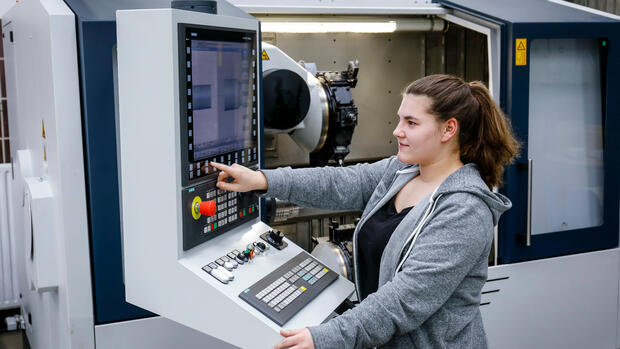Munich The corona pandemic and the outbreak of war in Ukraine disrupted supply chains worldwide. Many companies are now trying to make their supplier networks more resilient. “Companies are rebalancing the risks and want more redundancy in the supply chains,” says Xometry boss Randy Altschuler to Handelsblatt. If a supplier fails, there should always be alternatives.
Digital marketplaces such as Xometry, which sees itself as the world’s leading platform for so-called on-demand manufacturing, are benefiting from this trend. With the help of artificial intelligence (AI), suppliers can be found at very short notice to produce components on demand.
So far, Xometry has been particularly strong in the USA, where it accounts for 90 percent of its sales. “But there’s no reason why the market in Europe shouldn’t grow just as big,” says Altschuler. Sales have almost doubled here in the past two years, and the high rate of growth should be maintained.
Medium-sized companies get access to contract manufacturers all over the world
A lot of business is still carried out locally – a German customer orders metal parts from a German producer. But there are now increasing orders across national borders and continents. “Medium-sized companies also suddenly have access to suppliers all over the world,” says Altschuler. On the other hand, completely new customer groups opened up for producers.
If, for example, a special machine manufacturer needs a certain part in small or large quantities, he can be brought together on the platform with a medium-sized CNC milling company or a 3D printing specialist who currently has free capacity and material. Xometry handles the business and handles shipping, invoicing and quality control.
“Even medium-sized companies suddenly have access to suppliers all over the world.”
(Photo: Xometry)
The entire industry benefited from the fact that Xometry brought the topic of contract manufacturing to the big stage and made it interesting for investors, says an industry representative who did not want to be named. “This is the beacon of our industry.” This will take the market to a new level.
However, the business model also has disadvantages. Other platforms would bring buyers and producers together – they could then exchange manufacturing know-how, for example. If Xometry handles the business itself, this effect would be lost. “Neither side can actually want that.” However, real-time price determination is a step forward.
The mood among suppliers has deteriorated significantly
The fact that the platforms are increasing in importance also has to do with the weaker economy. The mood among suppliers has darkened significantly in recent months. The industry’s assessment of the current business situation deteriorated for the sixth time in a row in July.
According to the Supplier Industry Working Group, future expectations are “very pessimistic”. If the cost level that has risen due to wages and energy prices now meets with demand coming under further pressure, the “coming months will be another stress test for German suppliers,” warns the industry organization.
The possible economic downturn could therefore accelerate development, says Altschuler. Companies would have to reduce costs and work more efficiently. To date, there has been a lack of price transparency in contract manufacturing. This can now be produced.
The trend towards digital platforms exists throughout the economy, from awarding contracts to tradesmen to booking hotels, says Altschuler. “It is inevitable that the principle will also be implemented in production.”
One of the industry pioneers comes from Germany
Platforms for the manufacturing industry have been around for years. One of the pioneers on the market is Techpilot, which has a strong position in Germany and Europe and has already brokered an inquiry volume for production orders of more than 1.5 billion euros this year alone.
Techpilot founder Frank Sattler also observes: “The supply chain problems in recent years have given the topic an enormous boost.” Many buyers have looked for alternative procurement channels and tried out digital platforms for the first time. In addition, the prices for supplier parts have risen sharply in recent years.
The supply chain problems in recent years have given the topic an enormous boost. Frank Sattler, founder of Techpilot
Companies are now trying to reduce this again by using a broader supply base. On the other hand, producers were looking for new sales channels in the economic downturn. However, there is now also strong competition among the platforms.
Computing power and AI offer new possibilities: a drawing can be uploaded, software analyzes feasibility and the best manufacturing process. Many start-ups such as Fast Radius and the German Kreatize have now taken on the topic.
BMW is one of the customers
Before Xometry, Altschuler, a former Deutsche Bank manager with German roots, had already founded and successfully sold Office Tiger, an outsourcing specialist for office services, and the software platform Cloudblue. With his current company, he was the first in the area to succeed in attracting investors on a larger scale and raising around $200 million.
Early backers included BMW iVentures, Dell Technologies Capital and Robert Bosch Venture Capital. This enabled the business to expand quickly. Xometry currently has around 2,500 manufacturers in Europe connected to the platform. There are 10,000 manufacturers and almost 50,000 active customers worldwide.
A good portion of sales come from so-called additive manufacturing, i.e. industrial 3D printing. It entered the European market a few years ago with the takeover of the small Munich start-up Shift. Customers include BMW, which has spare parts manufactured via the platform if required.
Xometry went public via a merger last year. Sales rose 21 percent to $216 million in the first half of the year. The marketplace even increased revenue by almost 30 percent. However, the company is still not profitable.
More: Industry relocates production: 1.3 million jobs could be lost
